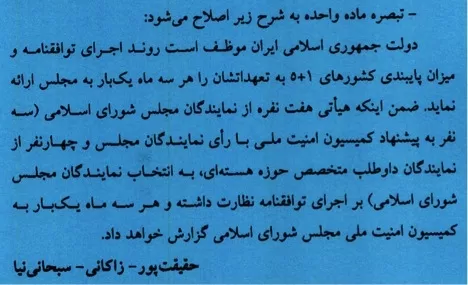Iranian Supreme Leader Ayatollah Ali Khamenei insisted earlier this month that the Iranian Parliament (Majles) vote on whether to implement the nuclear deal reached with the P5+1, weighing in on a long-running debate over the Majles’ role. But he refrained from clarifyinghow specifically the Majles should review the Joint Comprehensive Plan of Action (JCPOA),when it should review it, and what conclusion it should draw.
This post explains the background of the two ways the Majles is attempting to review the deal, and a timetable for when a conclusion should be clear.
“Not a matter of selling potatoes”
Much like in the United States, Iranian parliamentarians have vigorously pushed for legislative oversight over a final nuclear accord, and in June an overwhelming majority of lawmakerspassed legislation to that effect.
The initial version of the bill empowered a seven-member commission from the Majles to monitor the implementation of the agreement. The section of the bill, reproduced below (and available here), included no role for the Supreme National Security Council (SNSC). The SNSC, chaired by President Hassan Rouhani, comprises Iran’s top security officials and manages the nuclear portfolio.

However, in a last-minute change, the section was amended (below) to allow the SNSC to supervise the implementation. The seven-member commission was scrubbed.

This revised legislation passed on June 21 with 199 votes in favor (out of 213 members present).
“The nuclear issue is not a matter of selling potatoes in the country,” Speaker Ali Larijani said, addressing critics. “We must not tie the hands of the Supreme Leader in this matter, but we in the Majles must rather obey whatever decision he makes in this regard,” he added.
The SNSC has since convened expert discussions on the agreement and will issue its final conclusions “around the same time that the P5+1 announce theirs,” according to SNSC secretary Ali Shamkhani.
The “Special Committee”
Nevertheless, after the nuclear agreement was announced on July 14, Majles members said they intended to create a special committee to investigate the deal, although it would not have formal oversight power. Legislators also called for the ability to cast a vote on whether to move forward with the deal.
Alaeddin Boroujerdi, chair of the Majles National Security and Foreign Policy Committee, argued that the Majles should review the deal because “representatives have the right to raise concerns about the deal, since it is a historic deal in the political life of the Islamic Republic of Iran.”
To that end, the Majles on August 19 elected 15 of its members to serve on a “Special JCPOA Investigation Committee” (montage of committee members below). So far, the committee has heard testimony from current and former nuclear officials, including Foreign Minister Mohammad Javad Zarif and former nuclear negotiator Saeed Jalili.

The committee is not bound by a specific timeline, but Larijani indicated in a recent CNN interview that the Majles “will pass its judgment in a month,” or before October 2. He later toldthe Tasnim News Agency that the commission will finish its inquiry in late September, closely followed by a Majles vote. (On August 16, 201 lawmakers signed a petition calling for the government to submit the deal to the Majles “immediately” to allow for a vote.)
The actual mechanism of an eventual Majles vote is unclear. Members could insist on reviewing the agreement line-by-line – and try to amend it – or cast a simple up-or-down vote.
Rouhani’s opposition
Rouhani strongly opposes any kind of Majles vote, saying it would “place an unnecessary legal restriction on the Iranian people” by legally binding the government to adhere to a voluntary, political agreement. “If the Joint Comprehensive Plan of Action is sent to (and passed by) parliament, it will create an obligation for the government,” he said. “It will mean the president, who has not signed it so far, will have to sign it.”
Other members of the Rouhani administration, including those directly in charge of negotiating the nuclear agreement, have made similar arguments:
- Zarif said: “As a person who has taught law for quite some time, I have to tell you that the JCPOA is, in fact, under the management and supervision of the U.N. Security Council’s resolutions, which has nullified the previous resolutions.”
- Ali Akbar Salehi, chief of the Atomic Energy Organization of Iran, said: “Conventions and treaties should be presented to the parliament to be approved and the Joint Comprehensive Plan of Action is neither an international convention nor a treaty.”
- Deputy Foreign Minister Abbas Araqchi said: “From a national interest perspective, it is not in the interests of the country that Parliament approves through debate the JCPOA.”
- Deputy Foreign Minister Majid Takht-Ravanchi said: “There is no need for its ratification by the Majles” because the JCPOA is “not like a protocol or an international treaty.”
- Hamid Ba'idinezhad, the legal expert on Iran’s negotiating team, said: “The nature of this document is political and voluntary, and no sound mind would turn a voluntary, non-abiding text into an obligatory one.”
- Mohammed Bagher Nobakht, a senior Rouhani adviser, said: The agreement “does not require the approval of any institution other than the Supreme National Security Council.”
Khamenei’s announcement
Khamenei did not take a side in the executive-legislative dispute until September 3. Addressing the Assembly of Experts while sitting alongside Rouhani, Khamenei said: “In general — I have said this to Mr. President as well — I think that it is not in the interest of the country to sideline the Majles on this issue because after all, this is an issue that has occupied the attention of the country for two years and now these results have been achieved.”
“Therefore,” he added, “the Majles should get involved.”
But he did not issue a judgment about how the Majles should approach the agreement. “What should the nature of decision-making on this matter be?” he asked. “Should it take the form of ratification or should it take another form?”
Similarly, although he has called the conclusion of the nuclear agreement an “important achievement,” Khamenei noted that he has “no recommendations” for whether Majles members should ratify or reject the agreement.
“We will not say what the Majles should and should not do. We believe that it is good not to sideline the Majles because the people's representatives should make a decision in this regard,” he added.

Following Khamenei’s comments, Larijani also lended support to a Majles review. “The agreement needs to be discussed and needs to be approved by the Iranian parliament,” he told reporters in New York.
The secretary of the Expediency Council, Mohsen Rezayee, also expressed support for Majles vote. “It is good for the future history of Iran to have the Parliament review the endorsed agreement,” he said.
Outlook
Khamenei announced his decision before the US Congress formally weighed in on the deal; last week, the House overwhelmingly rejected the agreement and deal proponents blocked such a vote in the Senate. Khamenei has not revised his advice following these votes, and the special JCPOA committee has continued its hearings, suggesting that Khamenei will allow the Majles vote to take place later this month. Ultimately, few observers consider it likely that the Majles would be able to block the implementation of an agreement that the Supreme Leader has already allowed to proceed.
Rome, Henry. “Explainer: Iranian review of nuclear deal.” September 17, 2015


